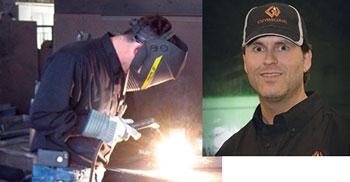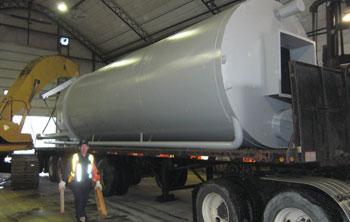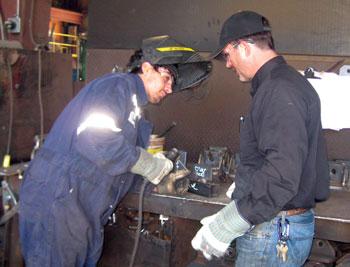- FMA
- The Fabricator
- FABTECH
- Canadian Metalworking
A Lawyer Behind the Weld Helmet
Brouillette urges manufacturers to get involved to move welding from the 10 worst jobs lists to the 10 best
- By Sue Roberts
- July 18, 2013
- Article
- Welding

Robert Brouillette, general manager at City Welding, Sudbury, Ont., left a successful career as a criminal lawyer to return to welding and the family business.
It’s a common success story. A one-man welding operation started in a garage. More than 40 years later, it has grown to be a respected company that serves regional industries, provides the community with 50 jobs, and is guided by a father and son team. A twist to this version is that the son headed down a decidedly different career path, did a U-turn, and returned to weld and help run the family business. Love and respect for the hands-on profession overtook the years spent pursuing a legal degree and becoming a partner in a law firm.
“I started sweeping floors at our weld shop when I was 12, but since grade 10 I had the desire to go to law school and pursue a legal career,” said Robert Brouillette, general manager of City Welding Ltd. in Greater Sudbury, Ont. “I was fortunate to have parents who said, ‘Do something that you have a passion for.’ So I went to law school, practiced in the areas of criminal and personal injury, as well as being a player agent for hockey players for 10 years, then came back to the family business in 2006.”
Trading Suits for Greens
A certified welder, Brouillette made the move from the courtroom to the shop floor for two main reasons. One was to allow his parents an opportunity to retire. “My father, Georges, who started the business in 1972, is so passionate and so good at what he does that he couldn’t pull himself away. My mum, Gisele, who did the books, retired in 2007,” said Brouillette.
The second reason encompasses goals for himself and the company’s employees. “For me it’s the opportunities in the welding field to be able to apply myself, create a good livelihood and retirement plan, and to effect change with regards to other families so they have the same opportunity.”
While growing up with welding, Brouillette gained a healthy respect for the people in the industry and the importance of welding to everyone’s day-to-day life. So the decision to return to manufacturing was accompanied by a dedication to fight the negative perception that lands welding on the top 10 worst job lists and discourages the younger generation from considering it as a good career choice.
Brouillette’s actions to unveil the positives of a welding career and reverse the negative perception begins within the company and expands into the public arena through work with educational institutions and community organizations.
New hires at City Welding are welcomed into the family and provided a variety of perks designed to make them feel at home. Welders receive logo coveralls, golf shirts, caps, and a good pension plan, along with the vision of the company. Opportunities for on-site continuing education help welders achieve certification and contribute to the accomplishment of the company motto, “Big or small—we do it all.” All employees, and especially those who have just entered the welding field, are encouraged to attend the Canadian Welding Association meetings and promote welding to their friends.
“Most of our fabrications end up in mining, transportation, or the oil sands industries, but we service people who come in off the street with a damaged rim, broken boat prop, or an antique chair that needs to be fixed. Then we have the fabricating equipment and skills to build a million-dollar piece of mining equipment. Our welding aspect is significant, but we also are known for our CNC cutting, forming, design work, sandblasting, and painting to give full service,” said Brouillette.
“I think we do a good job sharing our business model, letting our employees know what we expect, and engaging them in our future. We offer services so they can stick around on their own time and learn new welding procedures or just practice on different materials. They have access to our scrap. We also engage our suppliers to provide continuing education.”
For example, the benefits of moving to central gas distribution were shared with and understood by everyone at the shop before the change was made. “By the time a welder would realize he was out of gas, disconnect and carry the tank outside, grab and connect a full cylinder, and get going again, he was looking at 15 to 30 minutes of lost production. Timed by 35 or 38 welders a day, eliminating bottled gas provided a significant time savings as well as being a lot safer.”

Although welding services is its specialty, City Welding provides complete fabricating services including design, CNC profiling, shear and brake work, and finishing.
Promoting Welding Takes Action
“Promoting welding as a profession has been on my radar since I joined the company,” said Brouillette. “The money is made by the soldiers on the floor, not in the office setting. That needs to be recognized by our young people. Welding and some of the other trades were taken out of high schools 20-some years ago. So we have a 20-year shortage. We end up hiring foreign workers because we have a hard time getting skilled people.”
For several years Brouillette served on an advisory committee at Cambrian College, an English college of applied arts and technology that offers a variety of technician programs that include welding and fabrication skills. He currently sits on an advisory committee at Collège Boréal, a francophone college with credited programs for welder fitter and welding and fabricating technicians and welding and millwright apprenticeship programs. He advises on how the programs can close the gap between welding program graduates’ skills and manufacturers’ needs to produce welders better equipped to succeed in the workplace.
“Institutions don’t always understand the importance of students’ achievements. They put students on the honor roll when they achieve 80 percent, but as manufacturers we need 100 percent achievement or it’s somebody’s loss through an accident, a late order, or a plate that isn’t welded up to snuff.”
He also advocates for continuing education for welding instructors: “As a lawyer, I’m required to take 25 hours of continuing education every year to keep my license. I asked one of the college presidents what they do to keep teachers up to speed and he could not answer. Welding instructors need ongoing career development so they have the knowledge to teach a curriculum that is current and keeps graduates from bouncing from job to job because of inadequate skills.”
Taking Time to Teach
Five years ago the Social Services Division of Greater Sudbury developed a program in direct response to the area’s need for welders. Infrastructure money and repair work on existing equipment added to the demand for skilled welders, even though some segments were in an economic downturn. The training program works in conjunction with Collège Boréal and four local employers to produce welders who can easily and quickly transition into employment.
City Welding is one of the companies that shapes the curriculum, provides company tours so students can see welding in action, and frees supervisors to help teach the classes. “This program allows us [involved manufacturers] to dictate the curriculum. We can influence what is being taught by getting involved. The program allows industry to support the instructor and coach students to ensure what is being taught is current and what is expected from industry. Once a week we go to the college to work with the instructors and students. We give them an appreciation for the little tricks of the trade and teach them what is expected in actual production.”
Between 2010 and 2013, the program purchased 30 seats for fundamental welding training and the course was completed by 30 participants. Twenty-three of the participants are now employed. Fourteen additional students were slated to complete the course in June of this year.
Getting Involved
Brouillette takes the task of promoting welding very personally. He chose welding as his career after becoming a successful lawyer. He works to instill pride in the hands-on profession within his own company. He shares his expertise with educational institutions. He promotes the trade through associations. And he encourages other companies to become similarly engaged to move welding from the top 10 worst careers lists to the top 10 best careers lists.
“Regardless of where I go, 90 percent of the time the problem of skilled trades comes up. So I keep repeating, ‘Let’s get involved.’ The more you get people involved, the more you show that participating in a trades program is a good thing. You show young people the opportunities in welding and how it can be a good career,” said Brouillette.
“Welders change the face of the earth. If you take a snapshot of the world’s landscape every 24 hours, it will look different. A large part of that change has to do with the trades but significantly with work done by welders.”
Photos courtesy of City Welding.
subscribe now


Keep up to date with the latest news, events, and technology for all things metal from our pair of monthly magazines written specifically for Canadian manufacturers!
Start Your Free Subscription- Trending Articles
- Industry Events
Automate 2024
- May 6 - 9, 2024
- Chicago, IL
ANCA Open House
- May 7 - 8, 2024
- Wixom, MI
17th annual Joint Open House
- May 8 - 9, 2024
- Oakville and Mississauga, ON Canada
MME Saskatoon
- May 28, 2024
- Saskatoon, SK Canada
CME's Health & Safety Symposium for Manufacturers
- May 29, 2024
- Mississauga, ON Canada















